Women's Empowerment
Idea
Procedure
Constitution
Obstacles
Achievements
Social Change
Outlook
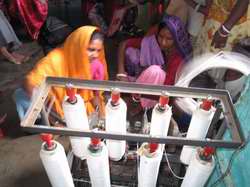
Gram Bharati Samiti's women's empowerment project focuses on the formation of self-help groups among the rural women who belong to the so-called Scheduled Castes(some of the castes identified by the Government of India as very backward ones) and other underprivileged groups.
Self-help groups (SHGs) are formations of 10-20 people, mostly women living in the Rajasthani countryside, that work to save and acquire money for themselves and their families. This is usually done by the means of small business activity: making handicraft work, spinning cloth, even running a dairy. It is possible, however, for the groups to limit their activities to just saving money and use for each other's needs. GBS has a large role in helping the group to get started and later offering the members general guidance and consultation.The SHGs improve the rural women's situation not only from a financial point of view but it also builds the women's knowledge, independence and confidence. Currently, 180 groups work all over Rajasthan, with over 2,000 active members.

Stage 1: the interested people call a meeting, resolve to form a SHG, pick a name and select a president, a secretary and a treasurer among themselves. They also decide how much money each member will contribute every month, the last date of giving the contribution to the treasurer, the amount of penalty to be charged in case he/she fails to obey the deadline, the rate of interest to be charged on the amount of money given to any of the members of the group, the date of the monthly meeting of the group etc. Each member starts saving a monthly contribution, as decided in the group.
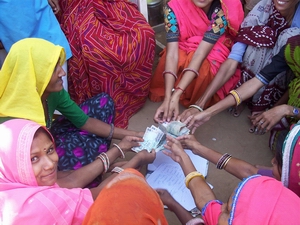 Stage 2: after a few months of saving money the group opens a joint bank account supported by GBS, since most of the women are illiterate and unaccustomed to these kinds of dealings. After continuing the Bank account for 6 months regularly, the SHG becomes eligible for a low-interest loan, operating on the concept of micro-credit, namely no sizable property is required to qualify for a loan.
Stage 2: after a few months of saving money the group opens a joint bank account supported by GBS, since most of the women are illiterate and unaccustomed to these kinds of dealings. After continuing the Bank account for 6 months regularly, the SHG becomes eligible for a low-interest loan, operating on the concept of micro-credit, namely no sizable property is required to qualify for a loan.
 The group can then spend the money to strengthen itself. According to their choice, the members are able to purchase production materials, machines, animals or vocational training. Sometimes the group invests for basic amenities that the whole community can use, such as a water pump. All decisions are made exclusively by the group itself, but consultation from GBS and the banks is available at all times. The income generated by all this flows directly into group's pockets, often substantially increasing the members' standard of living.
The group can then spend the money to strengthen itself. According to their choice, the members are able to purchase production materials, machines, animals or vocational training. Sometimes the group invests for basic amenities that the whole community can use, such as a water pump. All decisions are made exclusively by the group itself, but consultation from GBS and the banks is available at all times. The income generated by all this flows directly into group's pockets, often substantially increasing the members' standard of living.
Stage 3: the whole of the group or any of its members can take a loan from the bank for their income generation. Thus the members of the group become full-fledged small-scale entrepreneurs.
[return to top]
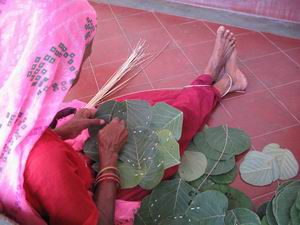
GBS's current SHG project is conducted in cooperation with the National Bank for Agriculture and Rural Development (NABARD). In the course of the project, begun in 2002, 100 self-help groups have been formed among the backward classes in the villages of Amber and Jamwaramgarh block of the Jaipur district and later linked with banks operating in the region.Previously, GBS was involved with roughly 80 'independent' SHGs in the same area, providing them consultation and guidance.
A typical group has a little over ten members, each paying a sum of 20-100 rupees every month to the group's account. The group decides independently the exact size of the monthly contribution and the loan sums, as well as what kind of an interest it will ask of its members.The banks only have a consultative role and emphasize their non-interference. Their one guideline is that a new SHG mus never miss its monthly deposit. The SHGs are all regularly visited by the GBS field coordinator and several field workers.
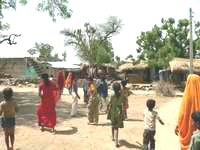
In its initial stages GBS field workers have to be aware of the fact that village communities are sometimes distrustful to strangers. It is not always easy for the women to see beyond their low status and lack of education to realize they are not destined to be poor. Moreover, many husbands tend to be highly suspicious of this new activity, fearing both for their family's money and their own position in the family.
[return to top]

The success stories from the SHGs confirm that the women have not only won the trust and respect of their communities, they have also made other gains. They do not have to do harsh and taxing farm chores to make a living, as the group provides them with an alternative source of income. The children of the members have a better chance of receiving a good education, because their labor is no longer required to support the family. In addition, they are much better equipped to help each other than before. When a SHG member has fallen victim to an accident such as a fire or an injury, several groups have reacted positively by collecting money for her and her family. None of these developments would have been possible without the self-help groups.
However, the most important success story concerns empowerment and willingness to fight the existing system. Before the self-help groups, the vast majority of lower-class families in the area were largely subdued to their position, ready to accept the social injustices that they had to face every day. Although this air of resignation is hard to remove completely, the self-confidence and financial independence brought about by the groups has definitely increased the women's motivation to fight for their rights.
[return to top]
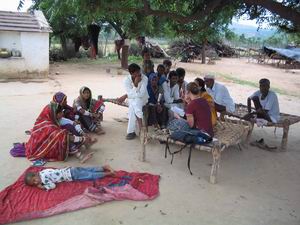
As an example of their increased determination, the group members have risen up and challenged the caste system, which is still a very powerful tradition in rural Rajasthan. In Dangarwara, the previously resigned Scheduled Caste women (the lowest category in the Indian caste hierarchy) no longer accepted their continuous mistreatment, choosing instead to go to the authorities and demand that their children be allowed to use the same facilities as everyone else's. Meanwhile, in the town of Raisar, some local high-caste Rajput women are actually involved in SHG work, offering their better education for common use in mixed-caste groups. Working together, the SHGs in Raisar were able to get local politicians to pave an important market street in their neighborhood.
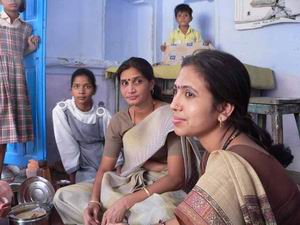
This progress is extremely positive, and promises much for the future. Many of the SHGs have large-scale plans for expanding and developing their business. They are thinking of buying new machines for increasing both quality and quantity in their products. Some even intend to corner the market in a particular trade in their region. Once the women realize their possibilities, they are as keen and ambitious as any entrepreneur is.
Thus, the improved financial situation, the marked increase in self-confidence and independence and a more responsible position in their communities are a powerful instrument in bringing an end to the exploitation of lower class rural women.
[return to top]
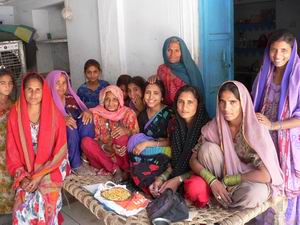 However, much remains to be done. The ancient caste system is still strong in Rajasthan and Scheduled Castes and Scheduled Tribes are being repressed on a daily basis by the higher castes. There are also many marginalized Muslim communities whose members live in a state of squalor. Numerous social traditions disfavor women, who are perceived as inferior to men, even though they might do more work for the family. It would be a mistake to consider a poor rural woman's life as anything else than unequal and harsh.
However, much remains to be done. The ancient caste system is still strong in Rajasthan and Scheduled Castes and Scheduled Tribes are being repressed on a daily basis by the higher castes. There are also many marginalized Muslim communities whose members live in a state of squalor. Numerous social traditions disfavor women, who are perceived as inferior to men, even though they might do more work for the family. It would be a mistake to consider a poor rural woman's life as anything else than unequal and harsh.
The key to conquering this situation lies in empowering the women into taking the control of their life in their own hands. Gram Bharati Samiti's project has worked well to this end, and will do so in the future. In July 2005, GBS and NABARD signed the formal agreement to create another 100 self-help groups in the country districts of the Jaipur area. The new project will take place over two years, and is set to start in the early autumn of 2005. Doubling the number of directly monitored groups will be a major expansion in the GBS program.
As the project expands, empowerment expands with it. One day, through hard work, these ripples may encompass the whole of Rajasthan - and women's independence and self-confidence will hopefully follow in their wake.
[return to top]
 Stage 2: after a few months of saving money the group opens a joint bank account supported by GBS, since most of the women are illiterate and unaccustomed to these kinds of dealings. After continuing the Bank account for 6 months regularly, the SHG becomes eligible for a low-interest loan, operating on the concept of micro-credit, namely no sizable property is required to qualify for a loan.
Stage 2: after a few months of saving money the group opens a joint bank account supported by GBS, since most of the women are illiterate and unaccustomed to these kinds of dealings. After continuing the Bank account for 6 months regularly, the SHG becomes eligible for a low-interest loan, operating on the concept of micro-credit, namely no sizable property is required to qualify for a loan.
 The group can then spend the money to strengthen itself. According to their choice, the members are able to purchase production materials, machines, animals or vocational training. Sometimes the group invests for basic amenities that the whole community can use, such as a water pump. All decisions are made exclusively by the group itself, but consultation from GBS and the banks is available at all times. The income generated by all this flows directly into group's pockets, often substantially increasing the members' standard of living.
The group can then spend the money to strengthen itself. According to their choice, the members are able to purchase production materials, machines, animals or vocational training. Sometimes the group invests for basic amenities that the whole community can use, such as a water pump. All decisions are made exclusively by the group itself, but consultation from GBS and the banks is available at all times. The income generated by all this flows directly into group's pockets, often substantially increasing the members' standard of living.







 However, much remains to be done. The ancient caste system is still strong in Rajasthan and Scheduled Castes and Scheduled Tribes are being repressed on a daily basis by the higher castes. There are also many marginalized Muslim communities whose members live in a state of squalor. Numerous social traditions disfavor women, who are perceived as inferior to men, even though they might do more work for the family. It would be a mistake to consider a poor rural woman's life as anything else than unequal and harsh.
However, much remains to be done. The ancient caste system is still strong in Rajasthan and Scheduled Castes and Scheduled Tribes are being repressed on a daily basis by the higher castes. There are also many marginalized Muslim communities whose members live in a state of squalor. Numerous social traditions disfavor women, who are perceived as inferior to men, even though they might do more work for the family. It would be a mistake to consider a poor rural woman's life as anything else than unequal and harsh.